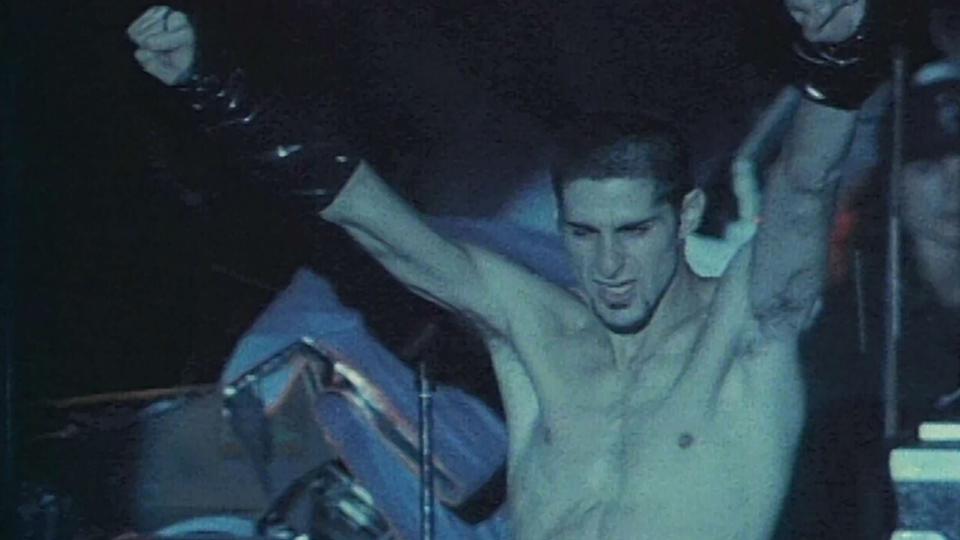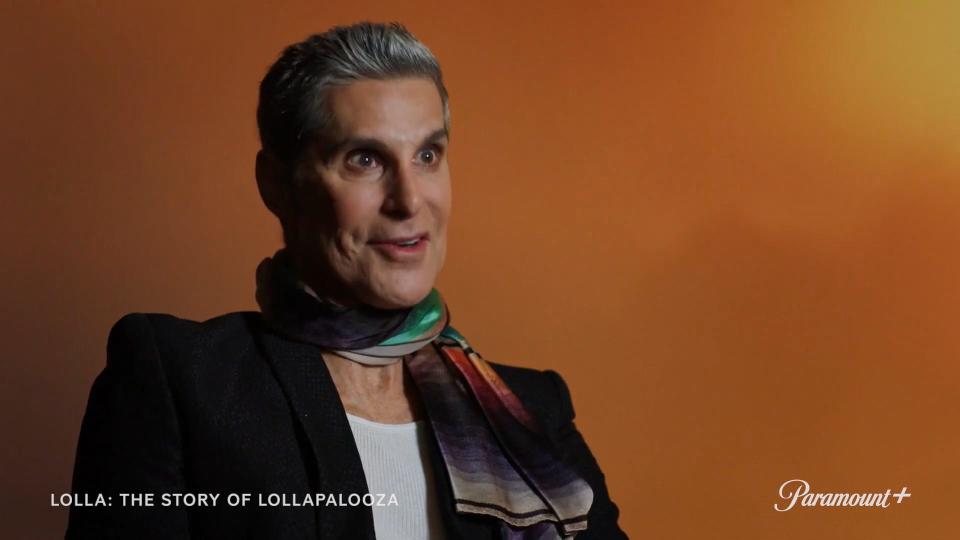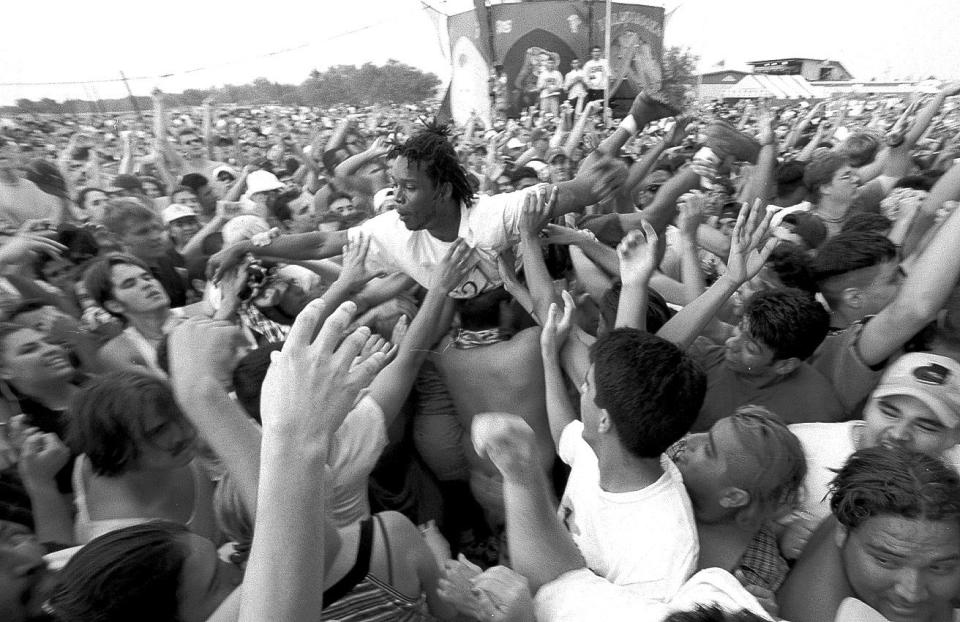New Lollapalooza documentary highlights festival's progressive cultural legacy
Since 1967's Summer of Love, the point at which popular culture and social change beautifully collide with the most significant impact has been a fertile one conjured by less than a dozen hands.
For three decades, one of those pair of hands has belonged to 65-year-old Jane's Addiction and Porno for Pyros band member Perry Farrell via the Lollapalooza Festival.
"Lollapalooza has created a space for society to mature and pursue the embrace of selfless, friendship-driven humanity," Farrell says in an interview with The Tennessean on a bright spring Saturday afternoon.
As the now Chicago-based but globally held and renowned festival prepares for its 27th iteration in August, its legacy is also being celebrated by "Lolla: The Story of Lollapalooza," a three-part docuseries airing on Paramount+. Through interviews, extensive archival footage and first-hand accounts, Lollapalooza co-founder Farrell and festival performers, including Ice-T, Trent Reznor and Red Hot Chili Peppers member Flea, reconnect with the festival and reflect on its cultural significance.
The documentary is produced by MTV Entertainment Studios and FunMeter in partnership with C3 Presents and is directed by Michael John Warren, the visionary behind Jay-Z's 20-year-old retrospective "Fade to Black."
Farrell and Warren, plus representatives of FunMeter's production company joined The Tennessean for an extensive conversation.
Lollapalooza's roots
Initially, the festival occurred because Farrell's work in the Los Angeles alt-pop and punk act Jane's Addiction was drawing to a close.
Ironically, this occurred as the band, via their "Ritual de lo Habitual" album and single "Been Caught Stealing," was the hottest act on alternative radio and a Grammy-nominated touring favorite benefitting from the latest era of MTV's cable boom.
However, 1990 also saw a trio of mid-tempo to near-ambient ballads — "Hold On" by Wilson Phillips, "It Must Have Been Love" by Roxette and Sinéad O'Connor's "Nothing Compares 2 U" — reach the top of the charts.
As a creator, Farrell is always one to provoke the trend that causes the wave.
Lollapalooza was also inspired by how far America's pop scene had strayed from a society where culture and change were synonymous.
Seeking that type of scene, Farrell headed to the U.K. in 1990 to perform at the Reading Festival as the Second Summer of Love era continued to grip the region.
Dance-ready Brit pop, classic East Coast U.S. and British punk, plus rock's hardest edges were all represented alongside a general era of good feeling.

Back in the United States in July 1991, Farrell and crew assembled nine other acts alongside Jane's Addiction for a 21-date North American tour. Yes, by 2023, roughly 20 times more acts were booked for the festival. However, the facets of the event's foundation that remain present in 2024 are profound.
Ushering in '90s era cultural evolution
"The Butthole Surfers' lead singer Gibby Haynes was walking around shoeless and firing buckshot in the air, while Henry Rollins, who looked like a muscled-out thug in jogging shorts, had set up a weight bench and was pumping iron," Farrell says.
"Then, a bunch of kids sitting in their houses playing in bands and watching MTV came out of their houses and went wild," he jokes.
Pop culture in the era found kids whose values did not align with the growing corporatization and materialism governing America's mainstream stage diving during punk shows at art houses and VFW halls. Until Lollapalooza, they were not gathering en masse, like their parents did, in amphitheaters and open fields.
Twenty-one times in the summer 1991, the festival day's starkest highlight was Farrell joining Los Angeles rap provocateur Ice-T's punk band Bodycount to perform a charged take on Sly and the Family Stone's 1969 track "Don't Call Me N-----, Whitey."
1991's inaugural Lollapalooza Festival opened only 137 days after Black motorist Rodney King was beaten by police in Los Angeles.

Regarding toeing the line between honesty and obscenity in 1991, a point about Farrell, and by extension Lollapalooza, becomes apparent.
"You can only have that moment occur in a space where everyone feels welcome," Farrell says.
"For three decades, at Lollapalooza, people from all walks of life, regardless of background, have had conversations governed by honest, intentional, respectful and responsible understanding — and yes, that means that the National Rifle Association and gun-control activists had booths next to each other — without causing a riot," says Warren.
On two occasions, Lollapalooza has successfully platformed the regeneration of global pop culture. That, more than the festival's revenue (in 2023, the American Lollapalooza festival contributed $422 million to Chicago's economy), motivates Farrell's continued desire to book the event.
In 1994, Lollapalooza's touring schedule intersected with events honoring Woodstock's 25th anniversary. Between both events, 100 acts were featured.

By 1998, Lollapalooza had been canceled. Some feel the lack of a headlining performer was to blame; others cite the mainstreaming of alternative rock as leading to the genre's declining popularity.
Lollapalooza's modern legacy
The festival was revived in 2005 to raise funds for Chicago's Grant Park and support arts education in Chicago's public school system. Just five years later, Lady Gaga — who had appeared as a side-stage act in 2007 — followed in a tradition hearkening back to Cypress Hill and Rage Against the Machine as former side-stage artists who can point to Lollapalooza as heralding their headliner-level acclaim.
"Underground punk kids will always make art for art's sake to reinvent culture and push the envelope forward," says Warren.
The immediacy at which digital, real-time, and streaming interactions deliver cultural evolution to a now perpetually global marketplace continues to benefit Lollapalooza. For the past decade, the festival has evolved into a genuinely intercontinental event, with dates booked in Asia, Europe, and South America.
"Beyond (merely) just being social, the festival occupying the same global and social system in which we're now forced to live, at all times, makes the love people have in their hearts that (governs our desires) do harder work not ever to feel phony," Farrell says.
When asked what excites him the most about what's forthcoming with the festival and his life in general, he pauses, then makes a statement that cycles society, in real time, back to what motivated him in 1991.
"I'm bored with culture's mainstream being so preoccupied with horrifying news stories," says Farrell. "I'd rather be more concerned with what Lollapalooza can do to make the world a better place."
Looking for reliable options to stream your favorite Hulu shows? Check out USA TODAY Home Internet for broadband service plans in your area.
This article originally appeared on Nashville Tennessean: Lollapalooza: New documentary highlights Chicago festival's legacy


